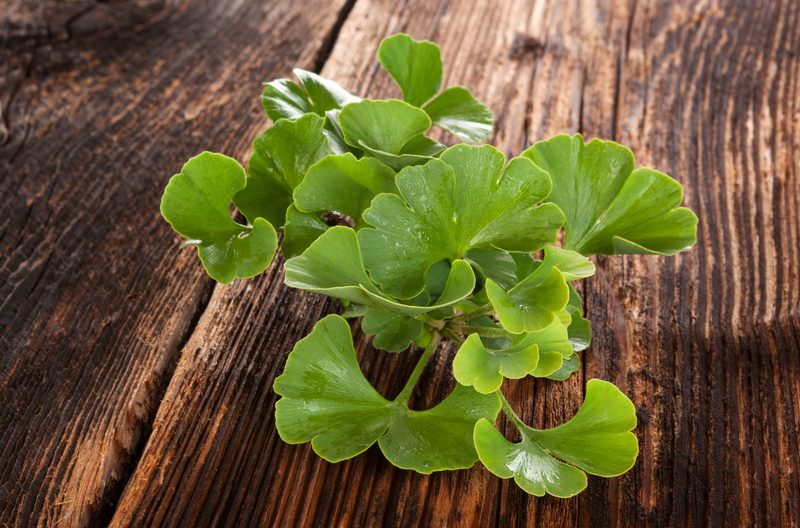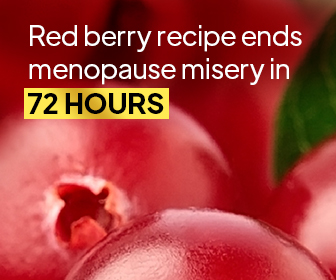Perhaps you are already familiar with ginkgo biloba. Also known as gingko or ginkgo, this ancient supplement is one of the bestselling herbal remedies in Europe and North America. If you aren’t familiar with it, don’t worry. This guide will give you a helpful overview of ginkgo biloba uses, what is ginkgo biloba, and how it works. As a powerful, natural antioxidant and anti-inflammatory, gingko has many applications. If you are looking for tips to fight aging or improve memory, this article is tailored especially for you.
With medical conditions, it’s always a good idea to consult a trusted doctor first. Although ginkgo biloba uses are beneficial for many ailments, a professional’s opinion should be the final word. For many people, natural remedies are becoming more popular as a potential first line of treatment for a variety of conditions. They are even available over-the-counter and less likely to have side effects. In other cases, supplements can be used together with other medications or treatment for an added benefit. Or perhaps you are not considering medication at all, but just want one of the best antioxidants to fight aging.
What is Ginkgo Biloba and Where Does It Come From?
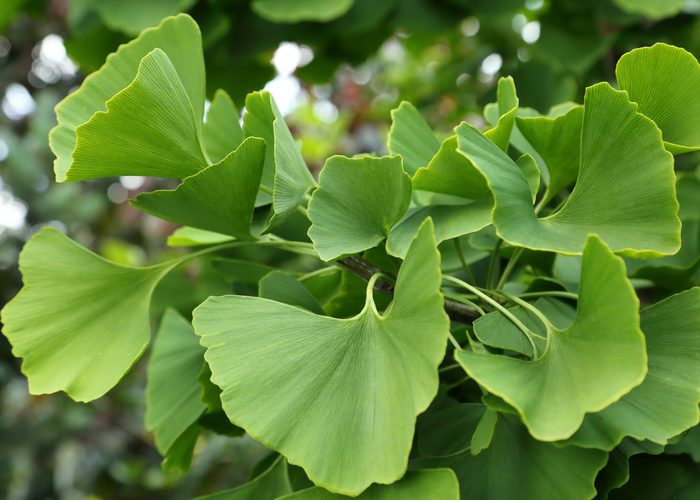
So, what is ginkgo biloba? Ginkgo biloba is the extract of leaves from the ginkgo, or maidenhair tree. This species is as old as time, found in almost 300-million-year-old fossils in China. The leaves of the ginkgo tree have been used in Chinese medicine since the 15th century. In the present day, the beneficial components are extracted from dried leaves for a wide variety of uses.[1]
The leaves contain 20 different types of antioxidants. Many studies have shown that diets rich in ginkgo biloba can reduce inflammation and even prevent heart disease and cancer.[2]
It is pretty impressive to see the source of this herbal medicine. A ginkgo tree can live up to 1,000 years and grow over 100 feet high. Some even believe that ginkgo biloba uses don’t only benefit humans. The same parts of the tree that benefit us humans are also responsible for its own legendary, robust health. At any rate, it’s pretty inspiring that we can benefit from such a long-living creature.
What Are the Benefits of Antioxidants for Aging?

In recent years, antioxidants have gotten a lot of press in the natural wellness industry as well as medical communities. As you may already know, antioxidants help stop free radicals in your body from damaging your cells. Fighting against this damage can help prevent heart disease, cancer, and other conditions.[3]
You can get antioxidants from a lot of different fruits, vegetables, and other wholesome foods. Antioxidants are also highly concentrated in ginkgo biloba. This potent anti-aging supplement doesn’t just fight disease: it also keeps you looking younger. Ginkgo biloba uses are diverse. It gives your skin much-needed elasticity, moisture and reduces wrinkles and blemishes.[4] Not to mention, this antioxidant can prevent disease and help you live longer.
What Are the Best Ginkgo Biloba Benefits for Anti-Aging?
The first thing that may come to mind when you think of “age-defying” is disappearing wrinkles. However, ginkgo has several other benefits for age-related problems that can affect your overall life.[5] It contains several powerful types of antioxidants that make it a catchall herb for the elderly. Ginkgo biloba uses are effective for treating several problems at once. It protects your cells from stress that both ages you and becomes more common as you get older.[6]
Here are several specific conditions and diseases related to aging that ginkgo eases:
Arteriosclerosis
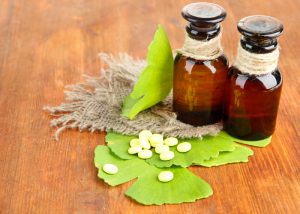
This condition is simply the hardening of the arteries that occurs over time. For some people, one of the effects of arteriosclerosis is making walking very painful and difficult. With ginkgo’s power for opening up clogged and hardened blood vessels, it’s no surprise that it can be a big help here.[7]
Glaucoma

Ginkgo, in general, can be beneficial for healthy vision. Glaucoma causes reduced blood flow to the eye. It’s no surprise that ginkgo is the best antioxidant to help. It also reduces the inflammation that causes extra pressure on the eye and a whole slew of problems. As a powerful antioxidant, gingko can prevent and fight aging of the optic nerve. It may be effective against pink eye too.[8]
Sexual Dysfunction

Without getting into too much detail, we know that gingko helps relax the muscles and promote blood flow. That means it does help men with erectile dysfunction. More surprising findings, however, are that it may help improve the libido of women taking SSRIs (a type of antidepressant). Besides the basic decrease in sex drive, these patients were also experiencing other issues (headache, upset stomach, central nervous system intrusion) that worsened the situation. In one study, ginkgo was found to help quite a lot.[9]
Migraines
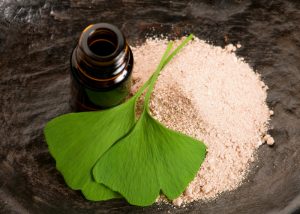
Again, ginkgo biloba uses are wide and far-reaching. It is the best antioxidant for treating and reducing migraines.[10]
Asthma/COPD
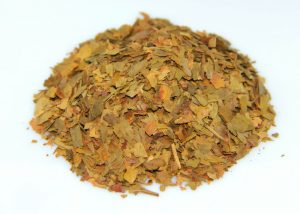
These two respiratory diseases inflame and narrow the passageway to the lungs. As an anti-inflammatory, gingko, of course, can help to reduce this inflammation and open the airways. Generally, it seems to take it as a supplement alongside other medical treatments.
Furthermore, it has been shown to reduce cough in cases of bronchitis. [11]
Although these issues may not directly seem to affect your appearance, they really do change your posture, energy, and overall look. Health problems can make a person appear more worn down and older. Considering how many different ginkgo biloba uses there are, it’s definitely one of the best antioxidants. It is also one of the best anti-aging supplements and can improve your overall wellbeing.
Ginkgo Biloba Uses for Your Skin
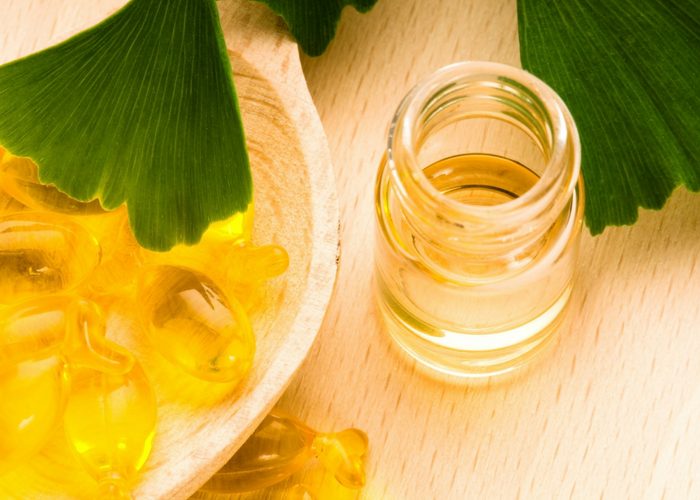
One of the best ginkgo biloba uses is as part of a healthy skin routine. Ginkgo is very potent for reducing inflammation. As one of the best antioxidants, it does wonders for healthy pores and elasticity. It is actually even used topically for similar age-fighting benefits.
Furthermore, gingko improves your blood flow dramatically, and getting nutrients in the blood to the skin of your face and body is vital.[12]
The herb can even help heal the pervasive skin condition called vitiligo. This condition, which Michael Jackson famously had, is marked by many patches of discoloration. Taking gingko can help restore an even color appearance to the skin, as well as reduce any sores.[13]
What Are the Top Ginkgo Biloba Benefits for Memory?
Declining memory as the years go by doesn’t just mean forgetting past events: it can impair a person’s day-to-day functioning and lower their mood. Fortunately, when using ginkgo biloba, memory has shown positive results for improving cognition, especially in the elderly. Science has shown that when you use ginkgo biloba, memory function improves.
Alzheimer’s Disease
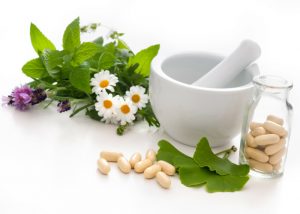
Unfortunately, there is not yet a cure for Alzheimer’s. This disease robs many of their memory, cognition, and happiness. Therefore, at this stage, prevention and prolonging healthy neurological function mean everything.
Fortunately, clinical trials have found that when using adequate doses of ginkgo biloba, memory loss is reduced. This can, in effect, lead to better functioning and overall cognition — even the ability to perform basic daily self-care tasks.[14] It has also been found that even when a patient is already taking prescription medication for Alzheimer’s, the supplement can promote improvements.[15] Though more research is needed, these trials do show promise.
Memory/Cognition
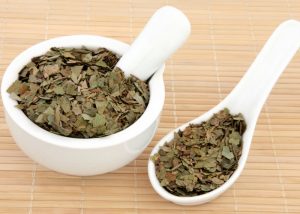
Those who do not suffer from Alzheimer’s can still reap the benefits of gingko’s effect on the brain. The remedy contains elements that boost your thinker, and also improve overall circulation there. The antioxidant properties are also responsible for repairing neural damage.[16] Improved cognition, in turn, means quicker reaction time, better mood, and an enhanced ability to focus on tasks and be aware of the environment.
Mental Health
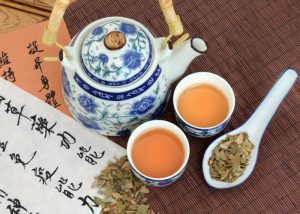
There is further evidence of gingko biloba’s uses in perking up the brain. Studies show it helps with ADHD.[17] Additionally, several other studies have shown gingko to help issues associated with anxiety, depression, and even schizophrenia.[18] There have been preliminary rat studies that show the promise it has in increasing dopamine levels[19], however more research is needed.
Ginkgo Biloba Side Effects
Although ginkgo biloba uses are wide and varied, this natural herbal supplement does have potential side effects. You should also be aware of drug interactions and conditions that may exclude you from taking it. For the most part, ginkgo is considered very safe, and serious side effects are rare. You mainly just want to be sure it is not a poor choice based on your medical history. As with any supplement, it’s always best to speak with your doctor before adding ginkgo biloba to your treatment. Furthermore, many of the potential side effects can be easily avoided with this precaution.[20] Side effects could include:
- Dizziness
The good news is gingko is helping your blood flow and loosening those vessels, but sometimes this might cause a little dizziness. It would be most noticeable when you make a sudden movement such as standing quickly from a seated position. This problem shouldn’t persist though. It’s usually just something that happens initially. - Nausea
Even multivitamins can cause nausea sometimes. When you start taking something new, your body may have to adjust a little. Nausea should not be too severe, and it should go away or start getting better after a few days. If it’s not, then you should talk to your doctor. - Abdominal cramps/diarrhea
This basically is like nausea: mild discomfort from adjusting to a new substance in the body that should subside quickly.[21] - Allergic reaction
This is very rare, as with a lot of drugs and supplements. But if you do develop a rash, contact your doctor.
You should most likely avoid gingko biloba if you have seizures or a heart condition, or if you are pregnant. Always discuss new supplements with a doctor before starting. Once you’re sure you’re good to go though, it’s time to pick what gingko to buy.
Buying Ginkgo Biloba
The fact that there are so many ginkgo biloba uses make it one of the most popular herbal supplements in the United States. Therefore, it is not hard to find. As one of the best antioxidants for anti-aging, it is available at most drug and department stores, as well as online. It does, however, come in several different forms, made by many different companies, so you will also have some choices to make. Though there is no fully standardized dose through the FDA, general research has set some recommended doses based on their trials for specific health problems.
Common doses range from 40 to 360 milligrams a day, though studies have tested amounts up to 600mg. First, let’s briefly cover the different forms in which ginkgo biloba comes:
- Supplement
- Extract
- Tea
On some level, what form you choose is a matter of preference, but there are a few things to keep in mind:
Ginkgo Biloba Supplements
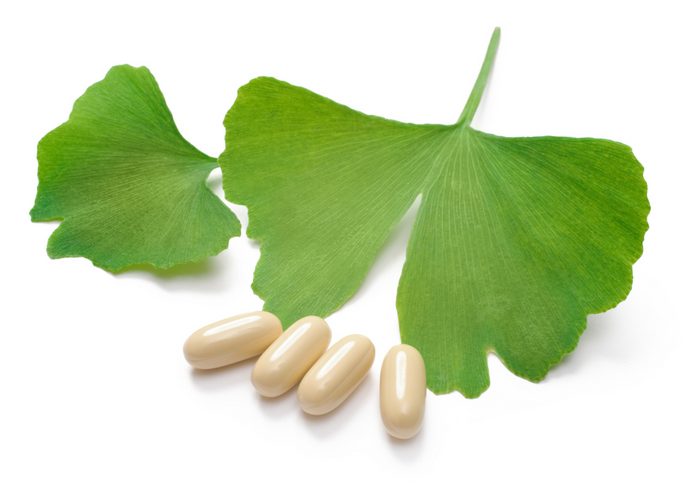
Supplements usually come in pill form. This is the form usually used in clinical trials and they come in a variety of strengths. The main reason supplements are used in most trials is that the dose is very controlled and precise. It’s also convenient to carry a few pills with you if you are taking 2 or 3 per day.
When purchasing a gingko biloba supplement, here are a few things you’ll want to look for:
- A brand you already trust. This one is pretty self-explanatory. If you like a brand and are already happy with their other products, you’ll probably like their ginkgo too.
- Inactive ingredients. It’s not always the case, but often this is just a fancy way of saying “filler.” Ever bought “salmon” cat food, but when you looked at the ingredients you noticed it’s actually mostly soybean meal? You want to check your labels for ginkgo biloba supplements. You only want the good stuff. A term to look for that means there is no filler is “medical grade.”
- Number of doses/strength of dose. Just like ginkgo biloba uses, people are all different. Health conditions are too. Ideally, a health professional could help you determine a dose, or else there are general recommendations based on the condition. In comparing prices and options, you may simply want to consider what amount is in each dose and how many doses there are per product.
- Ginkgolic acid. This usually is not an issue, but it’s worth pointing out that a reputable brand will probably list its content of this acid. It should be 5ppm or less.
Ginkgo Biloba Extract
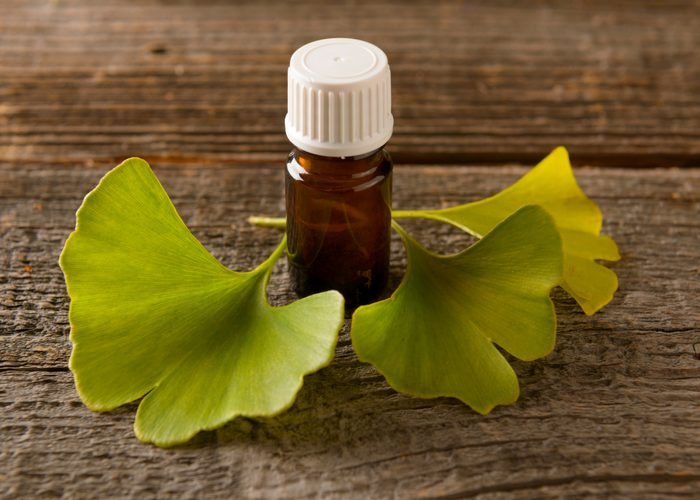
This extract comes in liquid form, often as a tincture, meaning that the concentrate is mixed with a carrier substance. One of the main advantages of an extract is that it can be quickly absorbed into the body. It is also a great alternative if you’re simply someone who can’t or doesn’t like to swallow pills. Of course, liquids may have more of a taste but many brands try to reduce this or may add a pleasant flavor.
Liquids are pretty convenient on the go as well, and you can dose fairly accurately with the dropper. You’ll probably want to make sure that the liquid contains only natural ingredients. Ginkgo biloba uses are most beneficial when there are no added chemicals. Most quality products also advertise as being alcohol- and preservative-free.
Ginkgo Biloba Tea
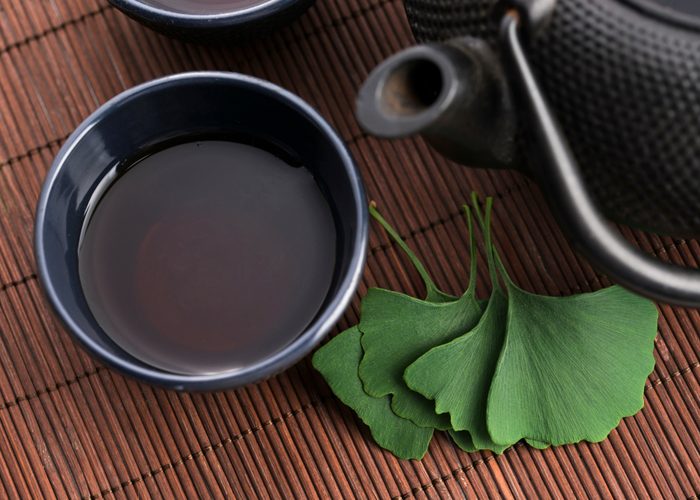
Ginkgo biloba tea is made from dried ginkgo leaves. This could be a great choice if you enjoy herbal teas. Another benefit is that it is often blended with another healthy variety of tea such as green tea or ginseng.
Overall, you just want confidence that you are buying a great product to ensure you’re truly reaping the antioxidant benefits ginkgo has to offer. Obviously, recommendations from a doctor, trusted friend, or even online customer reviews could help once you know the other specifics of what you’re looking for. If you are taking other supplements like ginseng, for instance, you may be able to find a blended assortment and kill two birds with one stone.
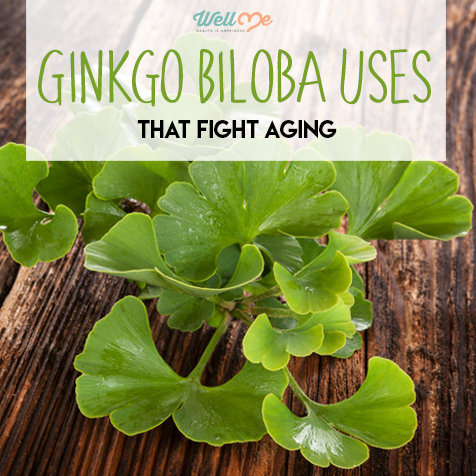
Conclusion
Aging and stress can do a lot of damage to the body. Luckily, ginkgo biloba is the best antioxidant to fight back and keep you healthy and happy. Its power as one of the best antioxidants for anti-aging, memory, and many diseases makes it stand out. Ginkgo biloba uses are a great safe substitute for many health issues, or a supplement to other treatments to help even more. These are probably just a few good reasons why ginkgo biloba has been around so long.
References
- [1] https://www.livestrong.com/article/492244-what-are-the-health-benefits-of-flavonoids/
- [2] https://www.livestrong.com/article/112367-benefits-ginkgo-biloba/
- [3] https://www.livestrong.com/article/190550-what-are-some-examples-of-antioxidants/
- [4] https://www.ncbi.nlm.nih.gov/pmc/articles/PMC2685276/
- [5] http://www.lifeextension.com/Magazine/2005/4/report_ginkgo/Page-02
- [6] https://www.ncbi.nlm.nih.gov/pubmed/23604306
- [7] https://www.ncbi.nlm.nih.gov/pubmedhealth/PMH0014207/
- [8] https://www.ncbi.nlm.nih.gov/pubmed/19396774
- [9] https://www.ncbi.nlm.nih.gov/pubmed/9611693
- [10] https://www.ncbi.nlm.nih.gov/pmc/articles/PMC3084934/
- [11] https://draxe.com/asthma-natural-remedies/
- [12] https://www.ncbi.nlm.nih.gov/pubmed/20412217
- [13] https://draxe.com/ginkgo-biloba-benefits/
- [14] https://www.ncbi.nlm.nih.gov/pubmedhealth/PMH0072541/
- [15] https://www.ncbi.nlm.nih.gov/pubmed/26268332
- [16] https://www.ncbi.nlm.nih.gov/pubmed/27414695
- [17] https://www.ncbi.nlm.nih.gov/pubmed/27414695
- [18] https://www.ncbi.nlm.nih.gov/pubmed/27908257
- [19] https://www.ncbi.nlm.nih.gov/pubmed/22784425
- [20] https://www.livestrong.com/article/326913-does-ginkgo-biloba-increase-circulation/
- [21] https://www.livestrong.com/article/420639-the-side-effects-of-ginkgo-biloba-for-migraines-headaches/

